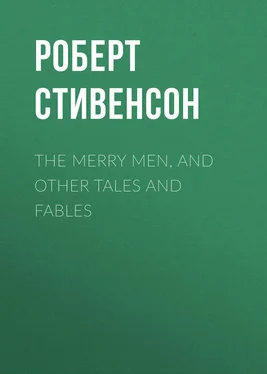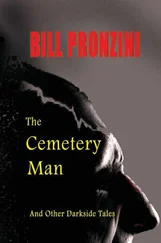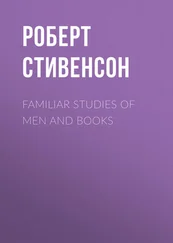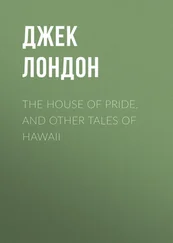Роберт Стивенсон - The Merry Men, and Other Tales and Fables
Здесь есть возможность читать онлайн «Роберт Стивенсон - The Merry Men, and Other Tales and Fables» — ознакомительный отрывок электронной книги совершенно бесплатно, а после прочтения отрывка купить полную версию. В некоторых случаях можно слушать аудио, скачать через торрент в формате fb2 и присутствует краткое содержание. Жанр: literature_19, foreign_antique, foreign_prose, на английском языке. Описание произведения, (предисловие) а так же отзывы посетителей доступны на портале библиотеки ЛибКат.
- Название:The Merry Men, and Other Tales and Fables
- Автор:
- Жанр:
- Год:неизвестен
- ISBN:нет данных
- Рейтинг книги:3 / 5. Голосов: 1
-
Избранное:Добавить в избранное
- Отзывы:
-
Ваша оценка:
- 60
- 1
- 2
- 3
- 4
- 5
The Merry Men, and Other Tales and Fables: краткое содержание, описание и аннотация
Предлагаем к чтению аннотацию, описание, краткое содержание или предисловие (зависит от того, что написал сам автор книги «The Merry Men, and Other Tales and Fables»). Если вы не нашли необходимую информацию о книге — напишите в комментариях, мы постараемся отыскать её.
The Merry Men, and Other Tales and Fables — читать онлайн ознакомительный отрывок
Ниже представлен текст книги, разбитый по страницам. Система сохранения места последней прочитанной страницы, позволяет с удобством читать онлайн бесплатно книгу «The Merry Men, and Other Tales and Fables», без необходимости каждый раз заново искать на чём Вы остановились. Поставьте закладку, и сможете в любой момент перейти на страницу, на которой закончили чтение.
Интервал:
Закладка:
‘You mean the fish?’ I asked.
‘Whatten fish?’ cried my uncle. ‘Fish, quo’ he! Fish! Your een are fu’ o’ fatness, man; your heid dozened wi’ carnal leir. Fish! it’s a bogle!’
He spoke with great vehemence, as though angry; and perhaps I was not very willing to be put down so shortly, for young men are disputatious. At least I remember I retorted hotly, crying out upon childish superstitions.
‘And ye come frae the College!’ sneered Uncle Gordon. ‘Gude kens what they learn folk there; it’s no muckle service onyway. Do ye think, man, that there’s naething in a’ yon saut wilderness o’ a world oot wast there, wi’ the sea grasses growin’, an’ the sea beasts fechtin’, an’ the sun glintin’ down into it, day by day? Na; the sea’s like the land, but fearsomer. If there’s folk ashore, there’s folk in the sea – deid they may be, but they’re folk whatever; and as for deils, there’s nane that’s like the sea deils. There’s no sae muckle harm in the land deils, when a’s said and done. Lang syne, when I was a callant in the south country, I mind there was an auld, bald bogle in the Peewie Moss. I got a glisk o’ him mysel’, sittin’ on his hunkers in a hag, as gray’s a tombstane. An’, troth, he was a fearsome-like taed. But he steered naebody. Nae doobt, if ane that was a reprobate, ane the Lord hated, had gane by there wi’ his sin still upon his stamach, nae doobt the creature would hae lowped upo’ the likes o’ him. But there’s deils in the deep sea would yoke on a communicant! Eh, sirs, if ye had gane doon wi’ the puir lads in the Christ-Anna , ye would ken by now the mercy o’ the seas. If ye had sailed it for as lang as me, ye would hate the thocht of it as I do. If ye had but used the een God gave ye, ye would hae learned the wickedness o’ that fause, saut, cauld, bullering creature, and of a’ that’s in it by the Lord’s permission: labsters an’ partans, an’ sic like, howking in the deid; muckle, gutsy, blawing whales; an’ fish – the hale clan o’ them – cauld-wamed, blind-eed uncanny ferlies. O, sirs,’ he cried, ‘the horror – the horror o’ the sea!’
We were all somewhat staggered by this outburst; and the speaker himself, after that last hoarse apostrophe, appeared to sink gloomily into his own thoughts. But Rorie, who was greedy of superstitious lore, recalled him to the subject by a question.
‘You will not ever have seen a teevil of the sea?’ he asked.
‘No clearly,’ replied the other. ‘I misdoobt if a mere man could see ane clearly and conteenue in the body. I hae sailed wi’ a lad – they ca’d him Sandy Gabart; he saw ane, shure eneueh, an’ shure eneueh it was the end of him. We were seeven days oot frae the Clyde – a sair wark we had had – gaun north wi’ seeds an’ braws an’ things for the Macleod. We had got in ower near under the Cutchull’ns, an’ had just gane about by soa, an’ were off on a lang tack, we thocht would maybe hauld as far’s Copnahow. I mind the nicht weel; a mune smoored wi’ mist; a fine gaun breeze upon the water, but no steedy; an’ – what nane o’ us likit to hear – anither wund gurlin’ owerheid, amang thae fearsome, auld stane craigs o’ the Cutchull’ns. Weel, Sandy was forrit wi’ the jib sheet; we couldnae see him for the mains’l, that had just begude to draw, when a’ at ance he gied a skirl. I luffed for my life, for I thocht we were ower near Soa; but na, it wasnae that, it was puir Sandy Gabart’s deid skreigh, or near hand, for he was deid in half an hour. A’t he could tell was that a sea deil, or sea bogle, or sea spenster, or sic-like, had clum up by the bowsprit, an’ gi’en him ae cauld, uncanny look. An’, or the life was oot o’ Sandy’s body, we kent weel what the thing betokened, and why the wund gurled in the taps o’ the Cutchull’ns; for doon it cam’ – a wund do I ca’ it! it was the wund o’ the Lord’s anger – an’ a’ that nicht we foucht like men dementit, and the niest that we kenned we were ashore in Loch Uskevagh, an’ the cocks were crawin’ in Benbecula.’
‘It will have been a merman,’ Rorie said.
‘A merman!’ screamed my uncle with immeasurable scorn. ‘Auld wives’ clavers! There’s nae sic things as mermen.’
‘But what was the creature like?’ I asked.
‘What like was it? Gude forbid that we suld ken what like it was! It had a kind of a heid upon it – man could say nae mair.’
Then Rorie, smarting under the affront, told several tales of mermen, mermaids, and sea-horses that had come ashore upon the islands and attacked the crews of boats upon the sea; and my uncle, in spite of his incredulity, listened with uneasy interest.
‘Aweel, aweel,’ he said, ‘it may be sae; I may be wrang; but I find nae word o’ mermen in the Scriptures.’
‘And you will find nae word of Aros Roost, maybe,’ objected Rorie, and his argument appeared to carry weight.
When dinner was over, my uncle carried me forth with him to a bank behind the house. It was a very hot and quiet afternoon; scarce a ripple anywhere upon the sea, nor any voice but the familiar voice of sheep and gulls; and perhaps in consequence of this repose in nature, my kinsman showed himself more rational and tranquil than before. He spoke evenly and almost cheerfully of my career, with every now and then a reference to the lost ship or the treasures it had brought to Aros. For my part, I listened to him in a sort of trance, gazing with all my heart on that remembered scene, and drinking gladly the sea-air and the smoke of peats that had been lit by Mary.
Perhaps an hour had passed when my uncle, who had all the while been covertly gazing on the surface of the little bay, rose to his feet and bade me follow his example. Now I should say that the great run of tide at the south-west end of Aros exercises a perturbing influence round all the coast. In Sandag Bay, to the south, a strong current runs at certain periods of the flood and ebb respectively; but in this northern bay – Aros Bay, as it is called – where the house stands and on which my uncle was now gazing, the only sign of disturbance is towards the end of the ebb, and even then it is too slight to be remarkable. When there is any swell, nothing can be seen at all; but when it is calm, as it often is, there appear certain strange, undecipherable marks – sea-runes, as we may name them – on the glassy surface of the bay. The like is common in a thousand places on the coast; and many a boy must have amused himself as I did, seeking to read in them some reference to himself or those he loved. It was to these marks that my uncle now directed my attention, struggling, as he did so, with an evident reluctance.
‘Do ye see yon scart upo’ the water?’ he inquired; ‘yon ane wast the gray stane? Ay? Weel, it’ll no be like a letter, wull it?’
‘Certainly it is,’ I replied. ‘I have often remarked it. It is like a C.’
He heaved a sigh as if heavily disappointed with my answer, and then added below his breath: ‘Ay, for the Christ-Anna .’
‘I used to suppose, sir, it was for myself,’ said I; ‘for my name is Charles.’
‘And so ye saw’t afore?’, he ran on, not heeding my remark. ‘Weel, weel, but that’s unco strange. Maybe, it’s been there waitin’, as a man wad say, through a’ the weary ages. Man, but that’s awfu’.’ And then, breaking off: ‘Ye’ll no see anither, will ye?’ he asked.
‘Yes,’ said I. ‘I see another very plainly, near the Ross side, where the road comes down – an M.’
‘An M,’ he repeated very low; and then, again after another pause: ‘An’ what wad ye make o’ that?’ he inquired.
‘I had always thought it to mean Mary, sir,’ I answered, growing somewhat red, convinced as I was in my own mind that I was on the threshold of a decisive explanation.
Читать дальшеИнтервал:
Закладка:
Похожие книги на «The Merry Men, and Other Tales and Fables»
Представляем Вашему вниманию похожие книги на «The Merry Men, and Other Tales and Fables» списком для выбора. Мы отобрали схожую по названию и смыслу литературу в надежде предоставить читателям больше вариантов отыскать новые, интересные, ещё непрочитанные произведения.
Обсуждение, отзывы о книге «The Merry Men, and Other Tales and Fables» и просто собственные мнения читателей. Оставьте ваши комментарии, напишите, что Вы думаете о произведении, его смысле или главных героях. Укажите что конкретно понравилось, а что нет, и почему Вы так считаете.












